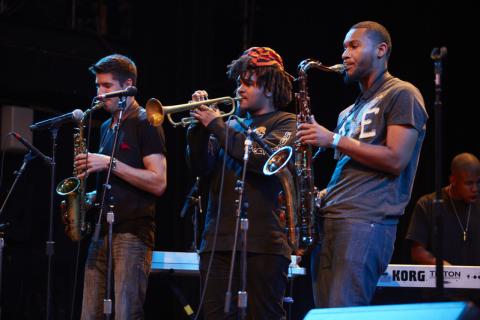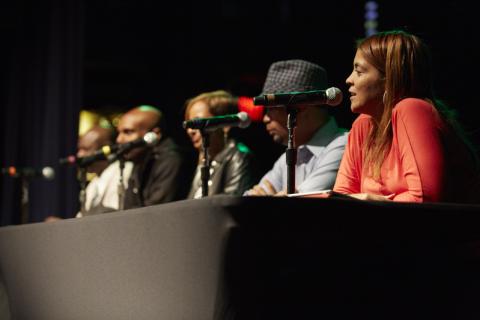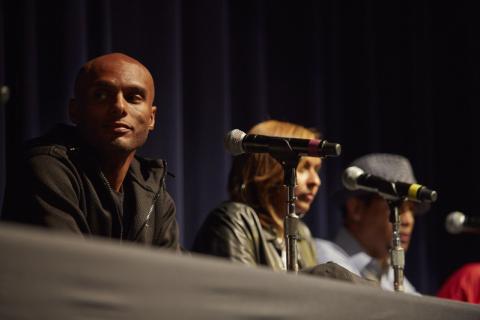Industry Experts School Students in the Business of Hip-Hop

The Berklee J Dilla Ensemble performs.
Kelly Davidson

From left to right, panelists Prince Charles Alexander, Kenny Lattimore, Shanti Das, Cappriccieo Scates, and Kim Osorio.
Kelly Davidson

Panelists Kenny Lattimore, Shanti Das, and Cappriccieo Scates.
Kelly Davidson
It was as much a DIY workshop as anything else.
A panel of industry professionals at Berklee's seventh annual Hip-Hop/Urban Music Symposium encouraged students to chart their own paths in the business, one characterized by an ever-changing music and media landscape. At the same time, they advised students to follow some fundamental principles: attain at least a rudimentary understanding of all aspects of the business and stay true to themselves while rolling with changes in culture and technology.
The theme of this year's symposium was "The ATLanta Connect," providing a forum to talk about Berklee's annual spring break trip to the city steeped in hip-hop history and innovation.
Following a performance by the J Dilla Ensemble, the panel of hip-hop luminaries whose journeys were strongly influenced by the Atlanta music scene took questions from an enthusiastic audience at the Berklee Performance Center.
The panel included Grammy-nominated singer-songwriter Kenny Lattimore; Kim Osorio, former editor-in-chief of The Source magazine; Shanti Das, marketing consultant and former vice president for urban marketing and artist development at Universal Motown Records; Cappriccieo Scates, executive general manager at Arrow Records; and Grammy-winning musician Prince Charles Alexander, who is also an associate professor of music production and engineering at Berklee.
“Music is regional; Atlanta had a story,” Lattimore said of the city that has become a hub for the genre. “I think we discount this because corporations run radio now and they homogenize everything.”
“Music has become more of a brand. If I say, ‘ba da ba da ba,’” Scates said, humming the McDonald’s jingle, and the audience ad-libbed “I’m lovin’ it,” illustrating his point.
According to the panelists, deeper connections can be made more readily in Atlanta than in larger markets like Los Angeles or New York City, and the cost of living for a young artist is significantly less.
Alexander, who leads the Atlanta trip, noted it’s important to remember the culture in which a music form was born, but to also leave room for innovation.
"Hip-hop is a genre that has most migrated to technical innovation," Alexander said, using T-Pain as an example of an artist who explores new areas in the form. "This is a long lineage of a genre that embraces technology. Does that mean that a song with no melody is uninteresting? I don’t see it that way."
“A kid in Atlanta buying a drum machine is like a kid in New Orleans with nothing but tap shoes,” he added, suggesting that young artists use the instruments and technology popularized and available in their community. “If you run away from the popularity of any music, you are turning your back on an audience.”
The message behind the music
But beyond talking about beats and melodies in contemporary hip-hop, some panelists touched on the content of its message.
“We were a political music when I came up,” said Kim Osario, former editor-in-chief for The Source magazine, who moderated the discussion.
While once the music was based in social issues, panelists said, its content has grown more commercial. But students argued that their generation’s social consciousness looks different from their parents.
With the advent of social media platforms, people are more connected and accessible than ever, but less united by specific causes.
Lattimore agreed, using panel favorite Kendrick as an example of an artist who explores such themes in his music. It was the rapper’s personal plight—as expressed in his lyrics—that resonated most for him.
“Maybe it’s individual movements to survive as opposed to civil rights struggle,” Lattimore said.
The technology both unites and divides in other ways as well. While it provides a direction connection with an audience and brings immediacy, it also gives “haters” a platform, panelists said.
“I don’t need to be taking pictures of myself on the beach with my girls out,” Das said. “Twitter is for business. Instagram is for business. You never know when someone is going to take a picture of you. It’s a very public industry. You have to know you always have to be on.”
That comes with a lot of pressure. Decide early on whether you’re up for it—and the many pitfalls that can come with success, fame, and wealth—and make a decision about your own brand, Lattimore said. Then manage all aspects of it closely. Even artists who aren’t good at managing money, he said, should keep tabs and not blindly trust a manager.
“Be the best that you can be at that and sign your own checks,” Lattimore said.
Success, the panelists said, will look different for everyone. For Scates, he once defined it by being able to take his kids to Disney. By the time he could afford it, he said, his son was 20.
“I’m the same age as Michael Jackson and I wanted to be as famous as Michael Jackson," said Alexander, who was born the same year as Jackson. "This is kind of a morbid story because I’m still here. What is success?”
